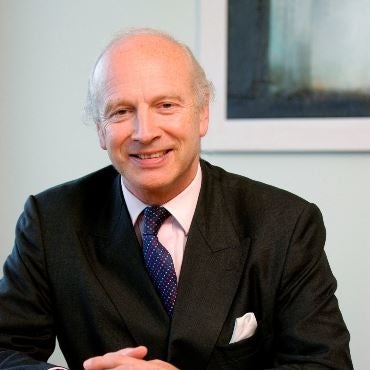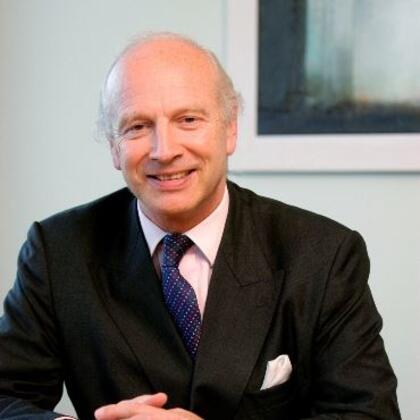City and business ethics - declining or improving?
Share
- Details
- Text
- Audio
- Downloads
- Extra Reading
Is the City a more honest place than it was forty years ago? Is my word still my bond? Has prescriptive regulation improved matters? Are victimless business offences really reprehensible? Have professional bodies made any contribution? How have businessmen's view of their ethical responsibilities to each other and to their stakeholders, and particularly their employees, changed? How will it change in the future?
Download Text
City and Business Ethics: Declining or Improving?
Professor Daniel Hodson
Guests: Sir Michael Jenkins OBE and Pen Kent CBE
In framing my programme of lectures for my final year as the Mercers School Memorial Professor of Commerce, I have decided to indulge myself and talk about a series of issues which I have regarded as being critically important in my own working career, now in its 40th year, if I include some formative months spent in the Australian bush working as a jackaroo - general dogs body - on a sheep station. There I learned self-reliance, how to take knocks, the pleasures of solitude and what to do with somebody who dared to impugn my parenthood as a Prisoner of Mother England, or 'pommy'. None of these have been lost on me in later life, although I have never yet had to resort to physical violence in sorting out a business problem; I suspect that some might well have been better resolved if I had.
My first such topic concerns the changes over time in business ethics and by extension honesty, principally in the City. I define honesty and ethics in this context are about truthfulness to other people and the world as a whole; about not taking advantage of the weak for personal gain, or advantaging one group or individual unfairly at the expense of another; about living within the prevailing law and regulatory environment, but also the broader code which business deems acceptable, as against unacceptable, behaviour.
In this discussion I am joined by two very distinguished City figures, Sir Michael Jenkins and Pen Kent.
It often said that one's first intuition is often one's best. There is also a very English tradition of believing that everything is inevitably going to the dogs. When I started preparing for this lecture I was firmly of the belief that the City was a more dishonest, less ethical place in which to work than it was when I first started here - the failed but wiser jackaroo - as a trainee first in the parlours of one of the great merchant banks and then subsequently on the international development programme of an American banking colossus. Many people of my generation are seriously discouraging their children from entertaining the Square Mile as a career, despite the blandishments - they consider it not the place that it was and full of people of lesser morality to those that they remember. The old values, which the City seemed to have encapsulated, were slipping away and a new, less attractive set had arrived.
But as I have pursued the subject my opinion has radically changed. Tonight therefore I shall argue that in many respects the City is a more honest place and certainly to its retail, and to a lesser extent business users. It is on the whole safer and fairer, as well as better value for money to do business there; furthermore the goods on offer are more transparent, and far more extensive, sophisticated and complex. But the City has of course also changed almost out of recognition over the past 40 years, in terms of markets, culture, regulation, governance, people and outlook and this has brought a change in the way in which people go about their daily business life and treat each other, in whatever capacity. There has been a radical alteration in the view of what is deemed acceptable as against unacceptable behaviour. There was, if you like, an unwritten code, which acted as a template against which business activities and interpersonal behaviour were measured, a code which was the product of the British post Victorian middle class, who peopled the managerial jobs in the City throughout most of the 20 th century, with clear notions of honour, truthfulness and fair play, always within but never specifically circumscribed by the law. It was encapsulated in the motto: 'My Word Is My Bond' The equivalent code and culture of today is that of international business of the 21st century, with a strong American flavour, which clearly operates within the law and the regulatory environment, but regards the central tenets of the earlier code not as permanent and necessary but expedient to the end, and therefore theoretically at least disposable where some greater purpose is justified. By any absolute standard therefore, the honesty and ethical standards employed within the City by its actual participants to each other, as against its users, has probably deteriorated. For instance players are constantly 'economic' with the truth, and occasionally bend it, or worse, as well as regularly looking for some coup which lies barely perceptibly inside the regulatory curtillage.
I shall end by looking at how these changes have affected a particular but hugely important stakeholder relationship, that of employer and employee. In many honourable cases in the City the paternalistic attitude of the employer continues, not least in self-interest, but also as a bastion against the deep decline in loyalty exhibited in so many instances both by employer and employee. This may be an inevitable feature of modern financial markets, but it is one that it is hard not to contemplate with sadness, as well as an intuitive malaise that such a culture does not build the sort of robust institutions that one would hope would populate the world's greatest financial centre, given that these firms are in effect little more than the people who work within them.
The City in the 60s
Let us begin by reminding ourselves of the City vista circa 1960. The most potent force, as it had been for many years before, was the raised eyebrow of the Old Lady of Threadneedle Street, alias the Bank of England. Investment banking was an alien activity that took place across the Atlantic , but was considered in the City vaguely like merchant banking, the inner sanctum of which was the Accepting Houses Committee, membership confined to the crème de la crème of merchant banks. The latter were all in British ownership and their chairmen were the undisputed grandees of the financial City, in conjunction with their opposite numbers in the clearing banks, and the respective Chairmen of the Stock Exchange and Lloyds. Self-regulation was the order of the day, with the Bank, via, quaintly, the so-called Discount Office, supervising the banking industry, but the markets, Lloyds and the Stock Exchange in particular, largely responsible for their own regulation. Above all a large proportion of its directors, partners and senior executives and managers had homogeneity of background - typically British, middle class, public school educated and male. The culture - the code as I have called it earlier - was almost wholly that of the latter group. Of course it was never written but its basic tenets were that people were truthful to each other, kept their bargains ('My Word Is My Bond') and were honourable in their behaviour, never taking advantage of the client, taking full responsibility for what went on under them, to the point of resignation if appropriate. There was loyalty to the institution in which one worked, and to one's fellow workmates, but there were absolute rules of behaviour which transcended even these duties.
By and large this orderly but softly defined environment worked according to its own tenets. It enabled for instance self-regulation to dominate the City regulatory environment long after many sophisticated markets, like those in the US had adopted a monolithic, prescriptive approach to regulation. It also had important substrata, which revolved round the concept of reputation and recommendation. On the one hand if an individual or firm broke the 'rules' in some way, this would in principle count against their ability to do business at a future date, and on the other the recommendation of a trusted party could go a long way towards the immediate acceptance of a potential business relationship, without too much further inquiry or analysis.
Abuses and dual standards
But it should never be thought of as being part of a golden age of high minded Victorian ethics, now vanished for ever, for it also had some rather surprising blind spots, the latter making it in so many ways the heyday of dual standards. Insider trading as defined today was practiced without reproach at a variety of levels. Favourite institutional clients of stockbrokers were given tips based on information which in today's world would count as 'inside' and the very heavy restrictions on the buying and selling of shares by the employees of firms who might be in receipt of price sensitive information from time to time were only patchily in place. Even in the early 1980s, when I was FD of a FTSE 100 company it was the practice to 'help' stockbrokers' and even buy-side institutional analysts with their forecasts for future trading.
It was an understood part of the remuneration package of those who worked in the corporate finance departments of a number of merchant banks that they would be automatically allocated disproportional numbers of shares in a new issue (IPO or initial public offering to modernists). If the issue was successful - and they usually are - the shares floated off at a substantial premium to the subscription price and wealth was automatically created for the lucky corporate financiers. In some houses it was acceptable even to 'stag! the issue! That is to sell in the hopefully strong rising market immediately after the shares were listed. Such opportunities did not exactly encourage corporate finance staff of the issuing bank to price the issue finely, and thus to the advantage of the client’s existing shareholders, but rather to set a significant discount - a clear conflict of interest.
Another interesting example of the system lay in the paying of interest rates, with major depositaries taking advantage of their market position. At least until the early 70s the London Clearing Banks were able to borrow substantial sums of money from their corporate clients by way of deposit at an interest rate known as London Deposit Rate (LDR), which was probably on average about 2% pa below the market rate. Blame perhaps the weakness of corporate treasurers of the time, a profession still finding its feet, but which once established soon helped to banish such oligopolistic practices. Its newly founded professional body, the Association of Corporate Treasurers, also was also in the forefront of getting rid of another abuse, the lack of transparency of and huge discrepancies in bank charges between clients.
Nor were such unseen and presumably unnoticed ways of taking advantage of the banker/client relationship and the latter's inertia confined to corporate relationships. The clearing bank profits were, until the introduction of interest bearing current accounts in the 70s, largely underwritten by the so-called 'endowment' effect, the huge interest-free balances kept on their current accounts. The building societies had their equivalent: first the low interest bearing 'share' accounts, which some customers may well have, still fondly believing that they are receiving the best rate available, although much finer rates have been available for many years. More recently the societies have 'managed' their deposit accounts, again by the use of client inertia, by introducing new ranges of accounts with good rates, to attract a new round of investors, and gradually letting the rates on older deposit products fall away to create a different form of 'endowment' effect. Hardly in accordance with the prevailing code, but nonetheless under the management of shining lights of the financial establishment who believed them to be upholding the finest traditions of City and banking practice and ethics.
To some the Guinness scandal was the turning point. In fact the blatancy of much of what was subsequently criticised illustrates very clearly the dual standards that did apply at the time. I was then FD of Unigate and I vividly remember meeting a rather confused Chairman one morning, who said he had just received two calls, one after the other, the first from the Argyll side (it is often forgotten that they were the antagonist in this struggle) and the other from Guinness representatives, each asking us to support their share prices – ‘and we’ll see you right’. Fortunately (is that the word?) when we appreciated what was going on, we were both horrified, and it only took a nano second to decide what our response would be. But the full frontal nature of the approach illustrates how mainstream the proposers thought the practice was, and it’s hard to believe that in reality this was little more than 15 years ago.
In addition, while reputation and recommendation became a substitute for hard-headed business analysis, these factors suffered a rapid dilution with the passing of time. All one needs for proof is the name Maxwell. In this context it is nice to be proved, for once, an accurate long range forecaster: in 1976, my younger brother, then in his last year at university wrote to me asking me for my opinion on the Bank of Credit and Commerce International (BCCI) with whom he had been offered a job. My response, which he unearthed when the institution was well and truly bust 20 years later, was 'pretty stinky reputation, avoid them like the plague'. Similarly a few years earlier even than that a banking client asked me for a reference on a young MP called Jeffrey Archer, through my parliamentary contacts. The reply: 'Don't touch him with a barge pole'. Time is certainly a great healer, although fundamentals endure.
A period of profound change
On of the City’s acknowledge strengths is, ironically in this context, its ability to change and reform itself to meet the exigencies of the time; and certainly the most profound influences on today’s City have undoubtedly been first the influx of foreign banks and then their increasing domination in terms of ownership, capital and volume of City markets and their participants. Perhaps first to feel their influence was the Bank of England itself. Today the Bank commands respect, still performs a key role as the UK's central bank and informal guardian of the City's markets, and has taken on a new independent role in the setting of interest rates, but has lost its regulatory function to the FSA; in addition its role and decisions are far more open to public scrutiny and challenge, and it has lost its former near God-like status. This latter change of attitude to the Bank began at the time of increasing influence of the US commercial banks in the 60s (although their London leadership was to a large extent happy to follow local London practices: my own employer, Chase, for instance accepted substantial amounts at London Deposit Rate) but much more when their more free spirited and aggressive cousins, the New York investment banks started to come to town in the late 70s and early 80s.
These firms undertook a sustained assault on local merchant banking markets, the arrangement of and advising on mergers and acquisitions, and were aggressive, innovative, energetic and most importantly with, for the most part vastly larger capital resources, which, where opportunity arose, they were prepared to put at substantially greater risk than their indigenous competitors. They brought with them Wall Street habits and practices and practitioners skilled in them.
They also brought new notions of compensation: low basic salaries, huge upside in bonuses, offset by a hire and fire mentality which was in stark contrast to the life long career structures and expected loyalty - both to and from the employee - that had long been a feature of City employment practices. They also set about consolidating their positions in two key ways: first by buying into the local merchant banking community, starting with members of the Accepting Houses Committee, and the major - up to then for the most part partnerships - stock broking entities in the City; and also by hiring and training British managers. Although the great US investment banks were in the van in this process, they were quickly joined by their European, principally French and German, equivalents, both commercial and investment banks. And to add to the ethnic and cultural melange, as each of these great finance houses added to their City properties, they brought nationals from their own base countries, and the whole process added to the attraction to people from overseas to seek work in the City.
All this means that today only a fraction of the capital and the ownership of the participants in City markets is actually owned or controlled in Britain . It also means that the senior executives, partners and other decision makers in the City, instead of coming for the most part from the comfortable middle-class public school educated classes, following the ways, culture and traditions of a British owned and managed City, and overwhelmingly male, as in past years, were selected and promoted on ability, and drawn not just from all educational backgrounds in Britain, but also significantly from the US, the continent of Europe, and the Far East, as well as from both genders. Furthermore their approach to business, and finance in particular, was drawn not just from City traditions but increasingly from major overseas financial markets, and of course principally from the US.
This was paralleled in the corporate world by the rise of the corporate treasurer, himself a meritocrat, technically and profit oriented who wanted competitive rates and innovative products out of his financial suppliers. He was concerned with results, with loyalty taking only a second rank; if his traditional suppliers did not pass muster, he did not hesitate to go elsewhere.
Changes in the regulatory environment
Certainly this change in culture and attitude within the markets themselves was one of the pressures, which led to the regulatory regime now enjoyed in London . This has itself been through several iterations, which it is not the intention of this lecture to describe, but suffice it to say that the regulatory regime, large swathes of which were self-regulatory prior to the Financial Services Act of 1986, has an over-ridingly prescriptive nature today. It has licensed a limited amount of self regulation within defined market places, but in general its approach has been to increase the volume and sophistication of the monitoring of market participants and users as well as the markets themselves; to ensure that individual participants are properly skilled and licensed and to discipline them hard if they err; generally to protect the 'weak' from exploitation in retail markets, but to take a more hands off approach to more sophisticated arenas where the maxim caveat emptor might reasonably apply; and at all times to increase levels of information and transparency available to all market participants, including users, to make the relevant markets fairer and more competitive. It has also sought to tighten up internal procedures and responsibilities within wholesale market participants, with for instance the widespread use, compulsory in many instances, of telephone recording, and also in focussing on improvements in governance and in particular of the application of the SEO (Senior Executive Officer) concept which clearly indicates the identity of the top executive within a regulated entity who is responsible, with no reneging, for everything that goes on within that operation.
Benefits to the retail user
This change within the regulatory environment, combined with external pressure from users, and specifically treasurers, has without a doubt had a beneficial effect on the fairness, transparency and ethics of most markets. Nowhere has this been truer than in retail markets particularly in the wake of the pensions miss-selling fiasco. Consumers are for the most part properly informed about the products they are considering buying, their pricing, the inherent risks, and what the competition have to offer. There is also considerable emphasis placed on the availability of independent intermediaries and information. There are still some black spots, most notably in the life insurance industry, where the mysteries of endowment policies still baffle investors into buying products which they do not necessarily want, and further exemplified by the Equitable Life saga. But the old abuses such as retail banks retail deposit 'management' are now things of the past.
A mixed impact on wholesale markets
In the corporate or wholesale markets, much too has greatly improved. Regulation, competition and greater user sophistication has led to far greater transparency in both pricing and financial risks and effects of given products, particularly in bank charges and the understanding of complex arrangements. In addition the impact of widely disseminated real time market information combined with tougher application of insider trading rules means that major investing institutions find themselves to a large extent at the same level in playing field 'terms as lowly retail investors. And corporate financiers in both investment banks and stockbrokers are usually forbidden to have any discretion over their personal equity investments and certainly those which might have any conflict with client business, and their opportunities for staging new issues are a footnote in financial history.
There is even a requirement for regulatory registration for individual market participants, certainly in derivative markets to undertake what are called 'ethics' courses. These are designed to teach such people first the shape and rationale for the regulatory environment, but also a summary of the absolutes of rights and wrongs, as well as their duties, in particular to their clients, and to a lesser extent to their employers. It is salutary that any confusion should exist in these individual's mindslin relation to these topics, but it certainly does in many cases.
These courses are a symptom of the potential downsides of today's culture, of the temptations and behaviour bred out of the pressure applied to such people; pressure applied by employer, peers, personal ambition and remuneration structure. The emphasis is on high performance, single-mindedness with rewards geared only to success, which leads to a degree of ruthlessness and selfishness which transcends normal social loyalties to employer (themselves not models of loyalty in these days) to clients and to others. Truth too is at least a partial victim. The increasing value placed on both internal and external communication, focusing much more on form, presentation and 'spin' rather than substance, means that it is perfectly respectable to be 'economical with the truth' in the famous words of Lord Armstrong if it serves the corporate purpose; certainly commentators, not entirely tongue in cheek, are apt to remind us that this is one of the stock in trades of accountancy, and it is certainly true of many corporate announcements. The latter are so often constructed round what they can get away with, not with clarity and providing a complete picture. And leaking is one of the less pleasant and more unethical of modern practices, the very word implying something unauthorised and/or a revelation of a secret or private matter.
The role of the press in these developments has been mixed, although mainly for the good. On the one hand, the vastly increased scope and professionalism of financial journalists, combined with the prevalent cult of investigative journalism, has undoubtedly had a great and positive impact on assisting the development of the current regulatory regime and in rooting out deceit, dishonesty and bad management. On the other hand, its methods have occasionally been questionable, the balance of its reporting not always perfect, and it has undoubtedly, by its activities contributed to the spin, truth diseconomy and leak culture which, rightly or wrongly, seems to persist.
Lying indeed is not a crime or a breach of the regulatory framework in itself, although it can be in certain circumstances. One of the great exponents of the judicious lie - always in the public interest, and never self serving - was the great 19th century prime minister Lord Salisbury . He knew that his being caught out might stand against him personally, but he was only interested in the good of the nation. The culture and pressure of today's financial world lead to a far greater use of economy and dilution of the truth, as well as leaks of secrets. It has also led to more interpersonal dishonesty particularly where personal or even business interests are at stake, and way beyond Lord Salisbury's altruistic test of acceptability.
I saw the ugly side of this at LIFFE, where I was CEO for nearly 6 years, and which had, like all self regulatory organisations, a disciplinary process to deal with transgressions of the market's rules. In case after case, one would find people under investigation who were prepared to say that black was white to defend what they had done, or to prove that they hadn’t done it, an approach to telling the truth that was not endearing.
The dangers of prescriptive regulation
In such a relatively ruthless environment, whilst prescriptive regulation may indeed be necessary, it too carries ethical burdens, particularly in wholesale markets. In the past, the ethical and self regulatory consensus created a broad field within which behaviour was acceptable. The fringes of this consensus were necessarily blurred, but it was dangerous to approach them, since there was always a real risk - but not a certainty - that, if one did so, the relevant activity would be considered inappropriate, resulting in regulatory censure, and, perhaps more important in those days, significant damage to reputation.
But prescriptive regulation is a licence for profit hungry and inventive minds, under pressure to achieve personal gain and profitability for the employer, to look for opportunities which are millimetres inside the regulatory perimeter. No matter that in past years they would never have been considered acceptable, and would have potentially resulted in ostracism - if they were inside the rules they were four square within the rules, with no gradation, as in former days.
As CEO of LIFFE I had ample evidence of this phenomenon, for, as part of our normal market supervision, we would closely follow the build up of market positions which were unusual. These positions usually belonged to blue chip market names, but all the same it sometimes took considerable powers of persuasion to get to the bottom of the objectives, project or anticipated coup which lay behind them. In several cases the latter involved some fairly unsavoury activities, usually taking advantage of rules or non-prescriptive market practices which were created for an entirely different purpose. And as a result I had on one or two occasions to ring the top man at the relevant institution to warn him of what was going on, and suggest to him (by definition I couldn't order him) that he got his troops to desist. In each case he did not know about the project, was suitably taken aback, and agreed to call a halt. This was not as altruistic as it sounds, as such affairs are usually risky, and he could readily see that his firm was exposed to considerable downside risk, both financial and reputational. My judgement on such affairs was that such fine institutions would never have undertaken them in the pre-prescriptive regulatory environment, but that if the bosses had refused to do anything, we would have had no further redress (except possibly a clandestine appeal to the Old Lady of Threadneedle Street) against them.
Employees as stakeholders – loyal unrewarded
Before concluding I should like to dwell briefly on the ethical changes over the years in the inter-relationship between the various stakeholders. One short way of dealing with this topic is to reflect that in the 1960s the modern meaning of the word 'stakeholder' would only have been understood by a handful of business academics whose professional interest lay in such matters. Today the word has a social and political meaning as well as an important place in our understanding of good governance. And the result is that, for the most part, the quality and balance of stakeholder relationships has vastly improved.
I would argue however that the City contains, at least in certain of its markets, examples of where a key stakeholder relationship has deteriorated significantly, that of employer with employee, foundering on the twin rocks of bad human resource management and mutual disloyalty. So far as the former is concerned the HR profession has in many enlightened employers within the City taken many steps forward, and the various topics of remuneration, communications, career planning and appraisal, motivation and caring are more to the fore than ever before. But, particularly in the markets and departments where packages have huge upside potential (such as trading rooms, corporate finance departments and fund management), quality HR management has been suspended, and there is, frankly, little or no loyalty in either direction between employee and employer.
This instinct is reinforced on a regular basis when one reads on the one hand of fresh demarches of teams of analysts, corporate financiers, and/or fund managers from one great institution to another, undoubtedly for still greater rewards, and under circumstances which would have been unthinkable 40 years ago - often assisted it must be added by the very head hunters who put them there in the first place, another breach of professional ethics which is deeply disturbing. On the other hand, and certainly an important factor in the former, is the willingness of employers to respond to temporary financial difficulties to fire often without warning and without consideration of the employee's past or future contribution; to resort to outsourcing to produce efficiencies, without thought of the impact on staff; and to ignore such fundamental concepts as career planning and regular appraisal.
This inevitably gives rise to concern for the future of such institutions at two key levels: the constant movement of senior managers and traders from firm to firm breaks down client relationships. A later lecture will deal in more detail with this subject, but client good will is a hugely valuable corporate asset and these employee characteristics can only undermine it to the detriment of the organisation. And second, most financial institutions are only as good as their people. If the quality people have no concept of or at least inclination to give loyalty to their employees, how strong is the institution and how easily might it simply unravel in the face of circumstances inimical to the employee? There are plenty of examples of firms acquired for their people and the new owners being faced by large numbers of empty desks. Indeed such transactions are considered (and where does this stand in the ethical balance?) open season for competitors and head-hunters alike, in search of new talent.
And yet the current environment, underlined by the tragic circumstances of 11th September, provides an opportunity. Regrouping in the face of economic downturn can assist a reappraisal of HR and remuneration policies, as well as corporate culture. However at a more specific level, one of the most moving sights has been the way in which firms caught in the Twin Towers holocaust have resurrected themselves, with courage and determination, as well as a desire to do their best for their colleagues who have passed on. Many of these firms were exactly the type to whom the breakdown of loyalty and interpersonal ethical undoubtedly, by its activities contributed to the spin, truth diseconomy and leak culture which, rightly or wrongly, seems to persist.
Conclusion
As ever, nothing is perfect and change brings improvement, but with sacrifices. The old practices and code which dominated the ethical and regulatory environment of the City had strengths and attractions to those who worked there, but considerable blemishes, which proved difficult to correct. The new City , with its global ownership and international, meritocratic workforce, has brought prescriptive regulation and a different outlook and approach to doing business. Such changes were inevitable, but they too have ethical downsides. On balance the City is a much fairer place to do business and the new world has benefited corporate and retail users and market participants alike. But in some respects it has become less honest, not least in the way in which, in so many places, the employee/employer relationship has degraded. One could perhaps say that My Word is still My Bond, but only when the conversation is being electronically recorded...
©Daniel Hodson, Gresham College , 10 October 2001
This event was on Wed, 10 Oct 2001
Support Gresham
Gresham College has offered an outstanding education to the public free of charge for over 400 years. Today, Gresham College plays an important role in fostering a love of learning and a greater understanding of ourselves and the world around us. Your donation will help to widen our reach and to broaden our audience, allowing more people to benefit from a high-quality education from some of the brightest minds.


 Login
Login







